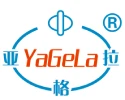Can Galvanized Welded Steel Tube be used for structural purposes?
Hey there! I'm a supplier of Galvanized Welded Steel Tubes, and I often get asked if these tubes can be used for structural purposes. Well, let's dig into this topic and find out.
First off, let's understand what a Galvanized Welded Steel Tube is. It's a steel tube that's been welded together and then coated with a layer of zinc through a process called galvanization. This zinc coating acts as a protective shield, preventing the steel from rusting and corroding.
Now, the big question: Can it be used for structural applications? The short answer is yes, but there are some factors to consider.
Strength and Durability
Galvanized Welded Steel Tubes have good strength properties. The steel itself provides a solid foundation, and the welding process ensures that the tube holds its shape and can withstand a certain amount of stress. The zinc coating adds to the durability by protecting the steel from the elements. In many structural applications where the load isn't extremely high, these tubes can work just fine.
For example, in small - scale construction projects like building a shed or a simple fence, Galvanized Welded Steel Tubes can be a great choice. They're strong enough to support the weight of the structure and can last for a long time thanks to the zinc coating.
However, in high - stress structural applications, like large - scale bridges or high - rise buildings, more considerations are needed. The welded joints need to be carefully inspected to ensure they meet the required strength standards. Sometimes, the welding process can create weak points, especially if it's not done correctly. So, for these heavy - duty projects, engineers might need to do additional testing and analysis to make sure the tubes can handle the load.
Corrosion Resistance
One of the major advantages of Galvanized Welded Steel Tubes is their corrosion resistance. The zinc coating acts as a sacrificial anode, which means it corrodes first before the steel underneath. This is a huge plus for structural applications, especially in outdoor or wet environments.
Imagine a structure near the coast, where the air is salty and humid. Without proper protection, steel would rust quickly. But a Galvanized Welded Steel Tube can resist the corrosive effects of the saltwater and last much longer. This reduces the need for frequent maintenance and replacement, which can save a lot of money in the long run.
Cost - Effectiveness
Galvanized Welded Steel Tubes are generally more cost - effective compared to some other structural materials. They're relatively inexpensive to produce, and the galvanization process isn't overly expensive either. This makes them a popular choice for many small to medium - sized structural projects where budget is a concern.


If you're building a small warehouse or a carport, using Galvanized Welded Steel Tubes can help you keep the costs down without sacrificing too much on quality. You get a decent amount of strength and good corrosion resistance at a reasonable price.
Limitations
Despite their many advantages, Galvanized Welded Steel Tubes do have some limitations. As mentioned earlier, the welded joints can be a potential weak point. In addition, the zinc coating can be damaged during handling or installation. If the coating is scratched or chipped, the exposed steel underneath can start to rust.
Also, in some extreme environments, like areas with high levels of industrial pollution or in contact with certain chemicals, the zinc coating might not provide enough protection. In these cases, additional protective coatings or alternative materials might be needed.
Comparing with Other Materials
Let's take a quick look at how Galvanized Welded Steel Tubes stack up against other common structural materials.
If we compare them with Welded Stainless Steel Pipe Tube, stainless steel has better corrosion resistance in a wider range of environments. But stainless steel is also more expensive. Galvanized Welded Steel Tubes offer a good balance between cost and corrosion resistance for many applications.
Mild Steel Round Bar is another option. Mild steel round bars are strong, but they lack the corrosion - resistant properties of galvanized tubes. If the structure is going to be exposed to the elements, a Galvanized Welded Steel Tube would be a better choice.
Stainless Steel Welded Seamless Pipe Tube is very strong and corrosion - resistant. However, it's also quite costly. Galvanized Welded Steel Tubes can be a more economical alternative for less demanding structural projects.
Making the Decision
So, when deciding whether to use Galvanized Welded Steel Tubes for a structural purpose, you need to consider the specific requirements of the project. Think about the load the structure will need to bear, the environment it will be in, and your budget.
If it's a small - scale project with a limited budget and a relatively low - stress environment, Galvanized Welded Steel Tubes are likely a great option. But for large - scale, high - stress projects, it's important to consult with a structural engineer who can assess whether these tubes are suitable.
Contact for Procurement
If you're considering using Galvanized Welded Steel Tubes for your next project, I'd love to have a chat with you. Whether you need more information about the tubes, want to discuss your project requirements, or are ready to place an order, don't hesitate to reach out. We can work together to find the best solution for your structural needs.
References
- "Steel Construction Manual" by the American Institute of Steel Construction
- "Corrosion Resistance of Metals and Alloys" by L. L. Shreir
- Industry reports on Galvanized Welded Steel Tubes from leading steel research organizations




